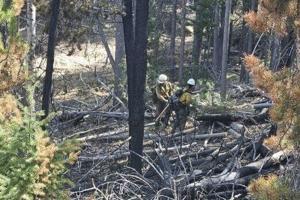A "born and bred Boltonian" coroner who recently retired has reflected on his 52-year career. Professor Dr Alan Walsh has retired from coronial duties after 24 years. Prof Walsh, now 74, started his legal career in 1973 at local firm Russell and Russell, before qualifying as a solicitor in 1975.
After just over a year, he was made partner, before becoming a joint senior partner in 1983. In 2001, he was approached by then-Bolton coroner, Aidan Cotter, to become an assistant coroner for Manchester West. Over his career, Prof Walsh rose through the ranks to become the area coroner, and even briefly took on the role of senior coroner after the sudden death of Jennifer Leeming in January 2019.

But on March 31 this year, he retired from his duties. Speaking to The Bolton News , Prof Walsh reflected on his 52-year career in the legal field and on what it takes to be a coroner. He said: "I have been very lucky, I am a true Boltonian, born and bred.
"Apart from my time at university, I have lived in Bolton all my life. "It was a pleasure, first of all to work at Russell and Russell for 37 years, which overlapped with my coronial work for nine years, and then, after I retired in 2010, I just worked as a coroner. "I have been able, for 52 years, to serve Bolton, both at Russell and Russell and as a coroner.
"I did some very high profile work as a solicitor, but nothing was as interesting as my coronial work. If I had not have qualified in law, I would have read medicine at university." Prof Walsh's valedictory at the Mayor's Parlour (Image: Cllr Andy Morgan) He added: "Coronial work is the perfect blend of law and medicine and I have been very fortunate to have that opportunity to practice in both of those fields.
When I was appointed a coroner in 2001, there was no open competition, you were just approached. "Aidan Cotter, the coroner for Manchester West, approached me looking for an assistant coroner. I was the main advocate in the town at the time, he did research and wanted someone local and invited me to become a coroner.
"You have to take the opportunity or don't, and I have always believed, when I speak to students and young people, I say to always take opportunities that come your way." Prof Walsh spoke about how one becomes a coroner, saying: "The starting point is a very supportive family. When you are in this for 24 hours a day on call, there is a lot of disruption and you need a very supportive and understanding wife.
"I could not have had someone better to support me and to have that understanding that the job includes all this potential disruption. I have been extremely lucky to have my wife, Linda, throughout it. Read more: Lawyer who helped save town’s court bows out Read more: Bolton solicitor to become youngest senior coroner in UK Read more: Concern over police's '8 hour' response time after woman discovered dead "When I was appointed I was told I would be sitting in court the following week.
I read the book of Professor Christopher Dorries, who I work with at the University of Greater Manchester, he wrote the book on coronial law. "I took the opportunity then to learn as much as I could from those who were much more experienced than me. My favourite question in court was to the doctor - 'can you explain it for members of the family?' "When really it's 'explain it to me'.
" Coronial law will live on in the family, with Prof Walsh's daughter, Rachael Griffin, serving as the senior coroner for Dorset - she was the youngest coroner in history when appointed in 2016 aged 36. He added: "Court craft, dealing with court and dealing with people is critically important. I attended criminal court, the magistrates, every day, on a busy day you would have 40 cases.
"That prepares your court craft. You have got to be prepared as a coroner to be sensitive, to recognise the sensitivity of the bereaved, and that is the difference. "It is important because it investigates death.
In my view nothing is more important than, sadly, someone's death, and to satisfy the bereaved as to the cause of that person's death. "The bereaved should be central to the investigation because I would want them to be satisfied as to how their loved one has come by their death." Prof Walsh and the Mayor of Bolton (Image: Cllr Andy Morgan) Prof Walsh added: "I suffered the great sadness of the death of Bolton coroner Jennifer Leeming on January 3, 2019.
I got the phone call that Mrs Leeming had died, and because I was the deputy, I was immediately thrust into the role of senior coroner. "I was very lucky that my background at Russell and Russell included managing the practice, so I had the organisational ability to do it without panicking. "We were then followed by Covid around 12 months later.
Timothy Brennand had not been appointed as senior coroner so I sat on Gold Command meetings once daily, if not more, at the height of Covid. "I think I have lived through a period as a coroner which has been very unique." Prof Walsh spoke about his most memorable case, the case of a woman from Bolton who died on a Ryanair flight from Manchester to Lanzarote.
There was no defibrillator onboard the flight. He said: "When they asked whether there was a doctor on board, a doctor came forward but there was no equipment other than a sparse medical bag. "I give great credit to Ryanair, who sent senior people to the hearing.
When they came to court I decided, through the airline authorities, to report this matter because of there being no bag and mask and no defibrillator on board. "Following my report in relation to the prevention of future deaths, Ryanair now carry life saving equipment on all their flights. It was broadened through European authority to all other airlines.
"Sadly, sometimes it takes a tragedy to highlight something that needs to be done." Prof Walsh also paid tribute to the team at Bolton Coroners' Court, saying: "The team are excellent, from the coroners down to the service manager, through to the officers. "I am proud of the service that we have given to the bereaved in Bolton, Salford, Wigan and Leigh.
".
Health

'Born-and-bred Boltonian' coroner reflects on distinguished 52-year career

A "born and bred Boltonian" coroner who recently retired has reflected on his 52-year career















